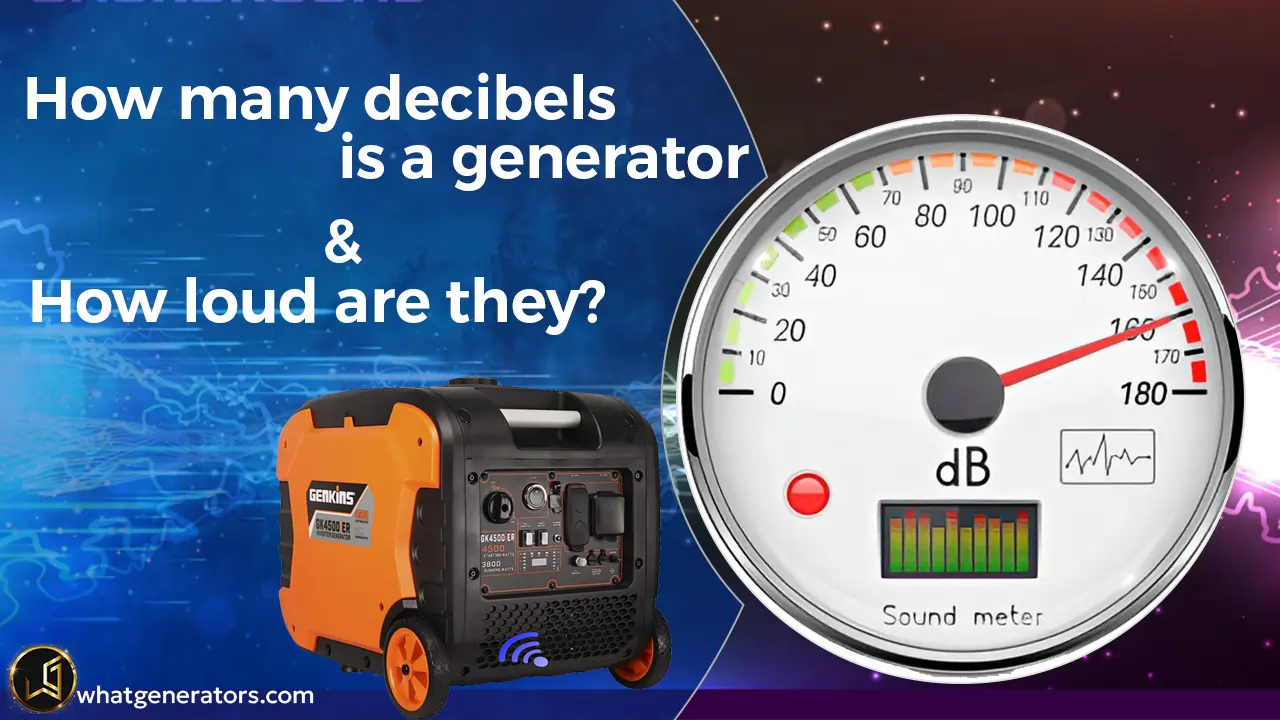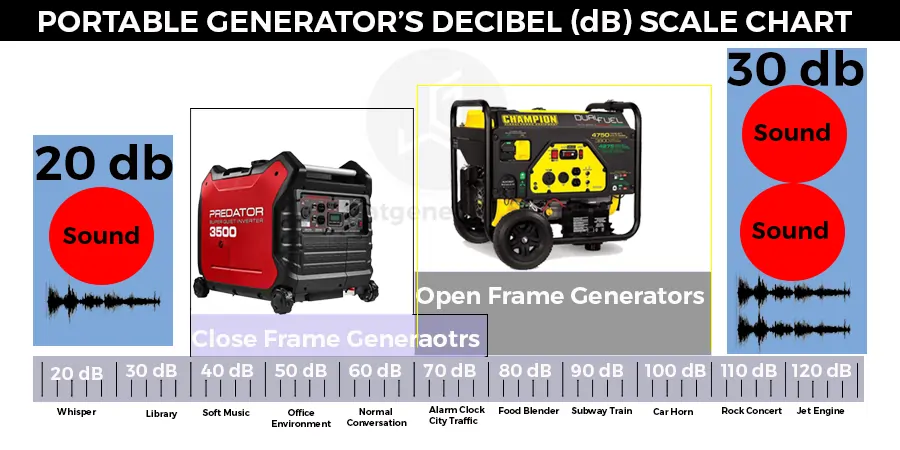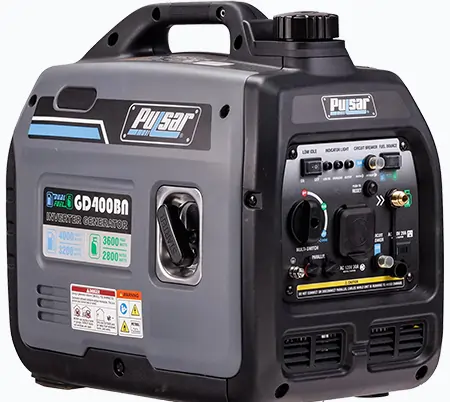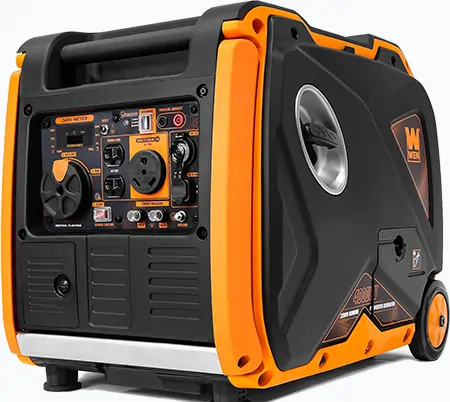
Understanding the importance of noise levels in generators is crucial for both residential and commercial users. Loud noise is not the only effect of environmental pollution but also leads to health issues such as stress, hearing loss, and sleep disturbances.
Therefore, when selecting a generator, it is essential to consider a model that has built-in noise-reduction technologies. A common question that our consumers often ask is, “How many decibels is a generator?”
Identifying and comparing the decibel ratings of different generators is critical to ensuring a quieter and more efficient choice that meets specific needs.
What is Decibels [Noise level]?
Decibels (dB) are a unit of measurement used to express the intensity of sound. The Decibel scale is logarithmic, not linear. This means that a small increase in decibels represents a large increase in sound (10 dB presents a tenfold increase in sound). For example, a sound that is 70 dB is ten times louder than a sound that is 60 dB.
Are generators loud?
Yes, Generators are loud, but the noise level depends on the type and design of the generator. Here’s a detailed breakdown to help understand the noise levels of different types of generators.
Open Frame Generators
Open-frame generators are typically louder because they have exposed engines. Their Noise levels usually range from 70 to 100 decibels (dB) at 1 meter distance.
Closed Frame Generators
These generators are designed to be quieter, with fully enclosed bodies and noise-reduction features. At a 1-meter distance, noise levels typically range from 50 to 70 dB.
Common Sound Sources and Their Decibel Levels
| Sound Source | dB(A) Estimate |
|---|---|
| Breathing | 10-15 |
| Whisper | 20-30 |
| Library | 30-40 |
| Soft Music | 40-50 |
| Office Environment | 50-60 |
| Normal Conversation | 60-70 |
| Alarm Clock (2 feet away) | 70-80 |
| Food Blender | 80-90 |
| Subway Train | 90-100 |
| Chainsaw | 90-110 |
| Ambulance Siren | 110-130 |
| Firecracker | 140-150 |
| Gunshot | 140-165 |
Decibels Ratting of Generators
Generators’ decibel (dB) ratings are crucial for selecting a model that meets your noise level requirements. Multiple generator brands have different decibel rates, and the type of generator also plays a crucial part in dB. ratted dBA for generators are 50 to 100.
Inverter generators:
- Typically range from 50 to 70 dB.
- Designed to be quieter and noise-reduction.
- It is ideal for residential use, camping, and outdoor activities.
- Example: A 2000W portable inverter generator might produce around 56 dB, which is similar to the noise level of a fan or refrigerator.
Traditional (Open Frame) Generators:
- Generally range from 70 to 100 dB.
- These generators have exposed engines and are typically louder.
- Suitable for construction sites or situations where noise is less of a concern.
- Example: A standard 2000W open-frame generator might produce around 75 dB, similar to a busy street or a vacuum cleaner.
If you want a generator for apartment read: Best generators for apartment living
What is a Low Decibel Generator?
Low-decibel generators are designed for lower noise operation. Typically, 50-70 dBA is considered low decibel generators.
| Model | Running Watts | Noise |
|---|---|---|
| Champion 2500 Ultra light Portable Dual Fuel | 2500-Watt | 53 dB from 23 feet |
| DuroMax 9500 | 9500 Watts | 74 dB |
| Honda EU2200i | 2200 Watts | 48 to 57 dB |
| Honda EU7000iS | 7000 Watts | 52 to 58 dB |
| Honda EB5000 | 5000 Watts | 63-65 dB |
| Onan P2500i | 2200 Watts | 52 dB |
| Onan P9500df | 7500 gas 6750 propane | 74 dB |
| Onan P4500i | 3700 Watts | 52 dB |
| Yamaha EF2800i | 2500 Watts | 65 dB |
| Yamaha EF3000iSE | 2800 Watts | 54.5 dB |
| PREDATOR 59137 | 3500 Watts | 56 dB |
| PREDATOR 59206 | 7250 Watts | 78 dB |
| DuroMax XP4500iH | 4500 Watts | 65 dB |
| DuroMax XP5500EH | 5500 Watts | 69 dB |

Why are Generators so loud?
Generators are loaded due to several factors, including engine size, design, and manufacturer. The primary source of generators is the combustion of the engine. The rapid expansion of gases within the engine cylinders creates mechanical vibrations and exhaust noise, which contribute to the overall sound output.
The exhaust system of a generator, including the muffler and exhaust pipe, can also increase noise levels. While mufflers are designed to reduce exhaust noise, they may only partially control it, especially in older or poorly maintained generators.
Higher power output often requires more fuel combustion, increasing engine noise.
Operating at total capacity or under heavy loads may produce more noise. The vibration of the generator can also cause noise.
You may like to read about 5 Best Silent Generators.
Quietest 4000 watt generators
The 4000-watt generator is the most commonly used for portable purposes. Our team at whatgenerators.com did some research about the quietest 4000-watt generator. As a result, we selected two of the quietest generators in the market, which are also available online.

Pulsar is a well-known brand that produces quality electric equipment. GD400BN can deliver 4000 watts of peak power and 3200 watts of running power. This super quiet generator makes around 59dB of noise at half load.

WEN generators are well known all over the USA. The 56400iX is one of their best models. With its CO sensor technology, this generator automatically shuts down whenever it detects carbon monoxide in its surroundings. This is the quietest generator in this category and produces only 57dBa.







